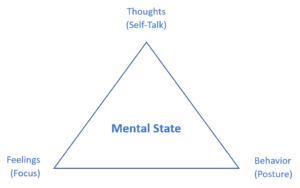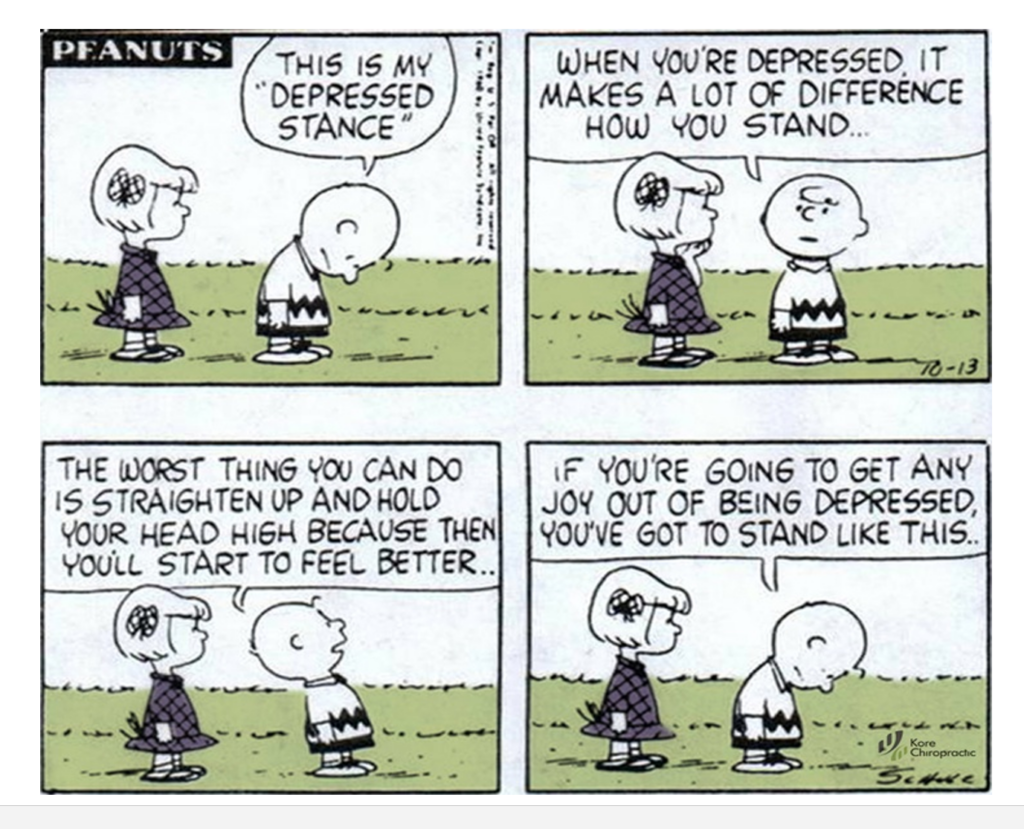I remember a Peanuts cartoon from years back. Here’s Charlie Brown, shoulders slumped, head down and arms at his side as Lucy approached. He says to Lucy, “This is my depressed stance. When you’re depressed it makes a lot of difference in how you stand. The worst thing you can do is straighten up and hold your head high because then you’ll feel better. If you’re going to get any joy out of being depressed, you have to stand like this.”
The Power in Your Posture and Physiology
I thought the cartoon was pretty funny. It is so true that how we hold our bodies makes a difference. There is a posture and even physiology that accompanies different mental states like depression, anxiety, fear, grief, guilt, inadequacy and also excitement, confidence, and happiness. You change your posture and physiology depending on the mental state you are experiencing or even want to experience. Of course, most of us do this unconsciously. But by becoming more aware, you can shift your energy and mental state by changing your posture. In fact, try this right now. Sit up. Put your shoulders back and hold your head up. Just sitting or standing tall can shift your energy in a way that makes a difference in how you feel.
The Response Triangle
 So let me expand on this idea by sharing what I call the Response Triangle. Notice the three points—thoughts, feelings, and behavior. I like to think of the triangle as our mental state. There is a mental state that represents depression. There is also a mental state that represents anxiety. Another that represents anger. One that represents happiness. Another that represents confidence. This is true for any of the mental states that we could talk about.
So let me expand on this idea by sharing what I call the Response Triangle. Notice the three points—thoughts, feelings, and behavior. I like to think of the triangle as our mental state. There is a mental state that represents depression. There is also a mental state that represents anxiety. Another that represents anger. One that represents happiness. Another that represents confidence. This is true for any of the mental states that we could talk about.
What this means is that we shift our overall mental state by altering our thoughts, feelings, and behavior. We can do this in the present moment by changing our self-talk (thoughts), changing the object of our focus (which changes our feelings) and altering our posture (a form of behavior).
If you want to change your mental state quickly, you do so by altering your physiology, your facial expression, how you’re holding your body, your gestures, etc. You can also change quickly by deliberately changing your self-talk from the mental state you’re currently experiencing to a state that you want to experience. It is also powerful to change your focus. Do you hear the anger in a loved one’s voice or see the pain in their eyes?
Stress Management Comes Down to Putting Yourself into a Different Mental State
This is huge for understanding how to manage stress as well as build resilience. Stress management is putting yourself into a different mental state, a state in which you interrupt negative patterns of thinking, feeling, and behaving and replace them with positive or empowering thoughts, emotions, and behavior. I used to do this regularly as I went into challenging encounters as a consultant.
I recall a trip to Miami, Florida in which I was asked to facilitate a meeting with an angry group of employees who had recently been informed of some changes to the design of their organization and changes in their role descriptions. My job was to quell the anger and open up a constructive conversation between these employees and their managers. My initial reaction was “Yikes!” I was slipping into a mental state of fear and so as I prepared for the meeting I deliberately took charge of my mental state.
I stood really tall and stretched my arms wide open. Then I puffed out my chest and then folded my arms across my chest in my best Superman impersonation. I choose to see the employees anger as a healthy response to recent changes. I saw this as an opportunity to help employees and managers work together towards a common future. My self-talk was, “I respect all these people.” “They need to be heard.” “All points of view are valid” “I can help them tap their common interest and move forward together.” “I’m the guy to help them do this.” “What an exciting day.”
It was an exciting day and we got to a good place. Still, a lot of work ahead but at least people were talking to each other. And I recognized that I could only help facilitate the process if I put myself in a positive and resourceful mental state.
It Takes Persistence
Of course, this isn’t easy. It takes discipline and practice. Nor does it mean that a given stressor will go away. Although we can often take action to eliminate many stressors, some are chronic and are going to persist. What changes is our ability to handle them. As I said in my last blog post, we want to learn to handle them from a calm and empowered state, from a wise mind rather than reactive mindset.
So as we continue talking about managing stress and building resilience, I’ll teach you strategies, habits, and practices to alter your stressful mental state by changing your thoughts, feelings and behavior. We often use techniques targeting one of these modalities but can also do something to impact all of them. In fact, there are lots of techniques to alter your stress-generated negative patterns of thinking, feeling, and behaving and replace them with a calm and empowered state of mind.
So let me ask you. What do you do when you’re in a negative mental state to shift to a more positive and resourceful way of being? What works for you?



Roger, you met my mom at a Making Things Happen group, so you KNOW how negative she was for almost all of her life. I remember as a 5 year old watching her bicker daily ad nauseum with my ‘new’ stepdad and thinking, “Good grief! I’m the most grown up person in our family and I’m only a kid!”. I observed her actions, responses, attitudes, and determined to do it differently in my life. So, in nearly every case I asked myself, “How would my mom respond?” then did the opposite. Then as I matured I read self help books, made needed course corrections, and had some counseling sessions with great counselors. It also helped that I chose a spouse who was also trying to do it better than his dysfunctional parents; and we’ve worked together on building solid, healthy, happy lives. I have lived, and continue to live a mostly happy life!
Thanks for your comment, Sandra. I do remember your mother so good for you for working so hard, through so many years, to overcome that early parenting and role modeling from her. It is nice that you have had awareness and been willing to do this work. In fact, it’s almost funny and that you would think of your mother and do the opposite.
I have found that learning to breathe properly has a huge effect on my ability to manage my stress response. I highly recommend Michael Bjiker as someone to look into.
Thanks, Justin. I’ll look into Michael Bjiker. I certainly agree that breathing is huge in mindfulness and our ability to handle stress.